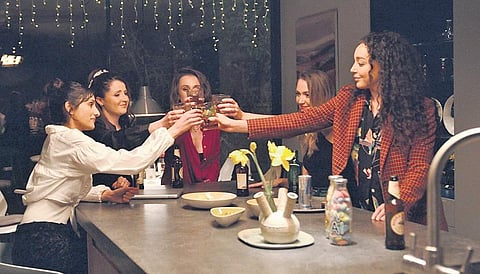

CHENNAI: An entry to the world of diversity, a welcome to the world of acceptance. The 11th edition of reel desires: Chennai International Queer Film Festival (CIQFF) at the Goethe-Institut, was an invite to the possibility of a better world where diversity is not a difference and being oneself is not a crime. The festival showcased 30 films portraying gender and sexualities, from 12 countries. The three-day festival was organised by Orinam and Goethe-Institut, in collaboration with Nirangal Charitable Trust and SAATHII.
“This year we are celebrating the 11th edition of CIQFF. In the place where I come from, 11 years is an important achievement. Carnivals will be hosted during that season and people can dress up as anybody they like to be,” said Katharina Görgen, director of Goethe-Institut, during the inauguration, adding that festival is a safe space for everyone. The inauguration was followed by a drag performance by Nethu Night Neelambari who danced to Billie Eilish’s Everything I Wanted and other songs, portraying the spirit of the festival — embracing oneself.
Featuring an arranged marriage in a utopian world of acceptance Chummy Matrimony (2021) was the first film to be screened. Thine Own Self (2021) spoke about the need of moving from the binaries of blue and pink, That Dark Day (2022) posed the question, Isn’t it important to recognise oneself?, Vaanavil (2022) portrayed the struggles of being a trans person in today’s world, Stiletto (2023) showcased an experience of a non-binary person. Owns The Sky?, the documentary film featured interviews with activists from artistic and academic environments in Argentina and Switzerland.
Felix, volunteer at Orinam, shared that CIQFF had received more than 100 entries this year. A community-led selection process resulted in the final shortlist. The highlight of this year was the play Neela Bhoomi directed by Tamilarasi R.
The films screened on day-2 focused on families of queer community — biological and chosen. This was followed by a panel discussion on Queer Families: Beyond the marriage equality debate. While all the members agreed that an option for marriage should be available for the queer community, they also expressed the need for other laws to protect them. “Section 377 has only decriminalised homosexual activity but it does not guarantee or provide acceptance in the community.
Right now, existing as a queer person is difficult. Marriage is cementing two identities, which are recognised in law but not given the opportunity to exist with each other” shared Chethana, a lawyer. She also spoke about how personal laws are inherently gendered, and it may not be possible to fit the community in existing notions of gender and sexuality present in religious laws surrounding marriage.
Addressing the struggles of the community members, Natasha, the moderator of the discussion said, “No matter how hard I work, my socio-economic status might never be equal to my co-workers who are not queer. I save up to afford gender-affirming care while cisgender heterosexuals have their healthcare covered as part of insurance. We are denied basic human rights. For us queer people, we are fighting every day trying to just exist, and that itself costs us so much.” Fred, a parent and a man of trans experience added that trans men are a minority of minorities. “Pertaining to Tamil Nadu trans men group of 300, only 20 are graduates.”
Change begins individually and at homes. Pratibha, a parent of a queer child, said that kids should be able to talk to their parents without worrying about the consequences. For the members coming from abusive families, Chethana advised that it is always best to take control of their certificates and identity documents. “It is also advisable to get identity proof in their current residence.” Fred added, “For trans people, changing the name and gender marker in educational documents itself is a hassle.” Prasanna who is in a queer relationship for almost 17 years shared,
“Marriage is about getting access to a lot of practical procedures. I cannot add my partner’s name as a dependent for insurance. My partner cannot stay with me when I am admitted to the hospital as a family member. Since we are not recognised as couples we can’t use any provision that’s available for couples which results in us paying higher tax almost 25%more than any heterosexual couples.” Though marriage equality won’t solve every problem the community faces, it definitely is one step closer to hope and progress.